CSotD: Scheduling Issues
Skip to comments
Today’s Zits (KFS) illustrates the problem I have with podcasts. It’s not that they’re a collection of belches and farts, exactly, but they tend to be just about that rigorous in the way they’re set up and planned out.
There’s already a certain amount of ego involved in thinking people want to know what’s on your mind, and, yes, that includes what I do every morning, as well as writing columns in newspapers and novels and poetry and so forth. But those things involve some planning and preparation: The CSotD you read in 10 minutes takes about four hours start to finish, and, unlike syndicated columnists, I don’t have to confer with editors, which would only add to the effort.
Verbal commentary is no less demanding: The best interviewers, like Terry Gross and Jon Stewart, have clearly prepped for their seemingly informal conversations, and Johnny Carson was legendary for the way he demanded everything be pre-planned and lined up just so.
Asking people to listen to you and your pals yak for 45 minutes is asking a lot. The least you could do is edit out the opening 15 minutes of random “What I did this weekend” warm-up chatter.
Even if you don’t edit the directionless wanderings in the remaining half hour, which few podcasts do.
My guess is that a tight 45-minute radio interview is probably edited down from a 90-minute conversation, and I’m as impressed with the production staff of Fresh Air’s ability to turn Terry Gross’s interviews around within 24 hours as I am with her own talent.
Most podcasts, by dismal contrast, remind me of Richard Brinsley Sheridan’s appraisal:
You write with ease to show your breeding,
But easy writing’s curst hard reading.
Now, as long as I’m flexing my Grumpy Old Man muscles …
Juxtaposition of the Day

(Dark Side of the Horse — AMS)
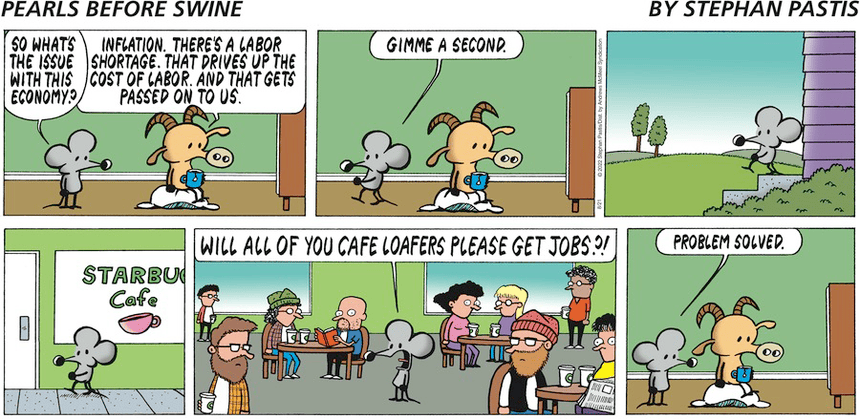

Again, this is possibly a personal thing. I prefer to work alone, in silence, and it took me awhile to get used to the bustle and chatter of a newsroom, so it’s hard for me to understand why someone would choose to take their work to a coffeeshop.
That’s aside from the matter of being a Starving Artist while drinking $5 coffees.
I knew a guy who, besotted with Hemingway, moved to Paris, rented a little apartment and discovered that he couldn’t write. I managed to fail as a novelist without having to get a passport or buy a plane ticket, just sitting at a cheap desk from the unfinished furniture store, drinking my own coffee.
For further reading, try Maugham’s “Of Human Bondage,” which is about young people going to Paris to become great artists. Among some other things.
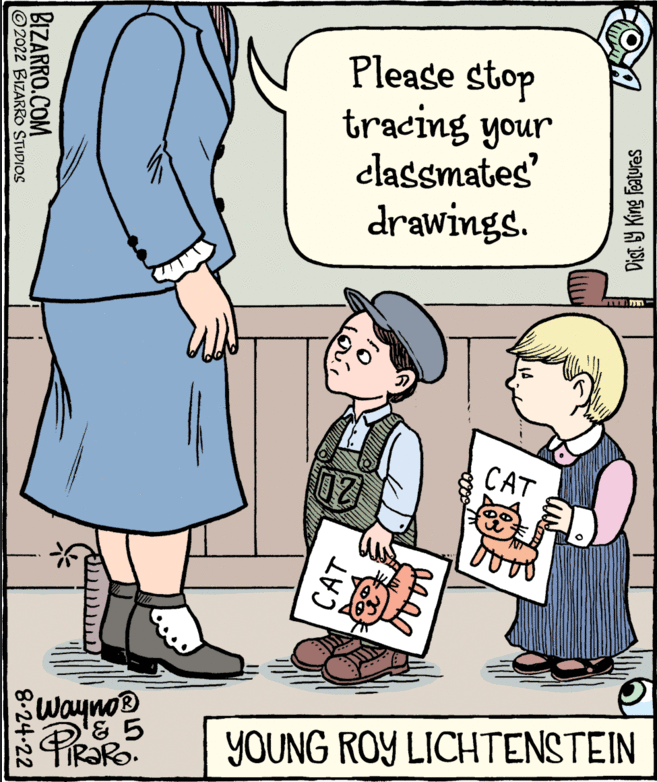
Speaking of aspiring artists, Bizarro (KFS) took a pretty good swipe at Roy Lichtenstein, who made a highly successful career of copying other people’s work. Not everyone whose work he “adapted” has been amused, and one fellow even made an extensive effort to track down the stolen work and connect it.
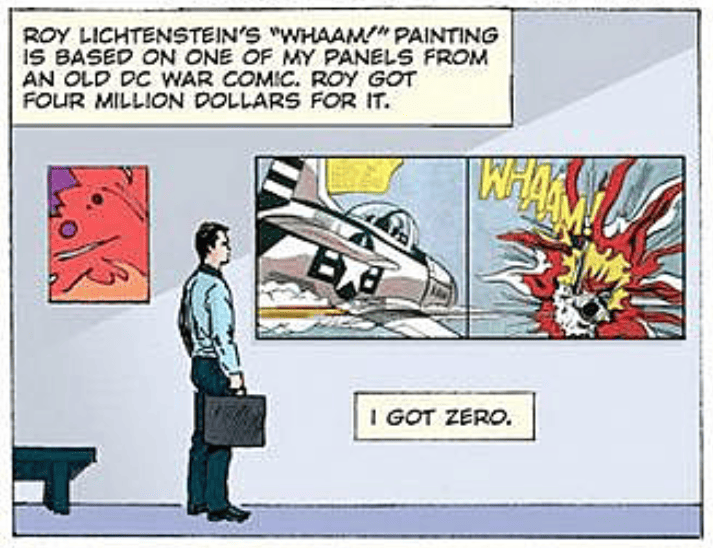
Russ Heath’s friends have not forgotten, particularly since Heath wound up living a very hard life after his days in the comics business.
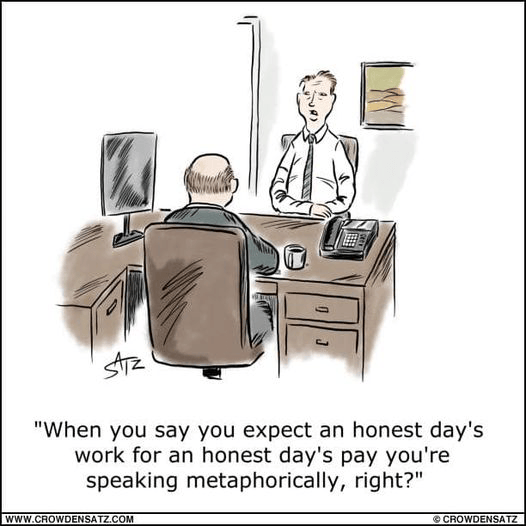
Crowden Satz brings to mind the topic of “Quiet Quitting,” which we went over a few days ago.
This cartoon not only brought the topic back up, but reminded me of sitting in a department head meeting as an editor. The publisher said we needed to generate more stories, and then, on another topic, that we needed to cut back on overtime.
There was a brief break while he left to get something, and I casually observed, “If we’re asking the reporters to do more work but not claim overtime, isn’t that sort of like telling them to falsify their time cards?”
There was a horrified gasp around the table and the circulation director said I shouldn’t have said that. He didn’t say I was wrong, mind you, just that it wasn’t something anybody should say.
Though, at another paper where I was only a reporter, a relatively new reporter was assigned to review a book, which she did. And then she put in for the time spent reading it, which was a pretty hefty chunk of change.
She was absolutely entitled to do that, given that she had been told to read the book. And, certainly, had she been sent to see a play or review an exhibit at an art museum, nobody would question her keeping track of her time.
But this was uncharted territory and we were all quietly delighted. They had to pay her the overtime, but that was the last book she was ever asked to review.
Once I became an editor, of course, I was on salary, at which point OT stands for “own time,” and nobody ever directed me to put a limit on that.

As Jonesy suggests, it wouldn’t be fair to demand that the ownership chip in to acknowledge extra efforts.

Baby Blues (AMS) explores a different kind of time management, and brought back the days when I had one son in half-day pre-school and another who was a wee baby.
Grocery day got down to a precise science: Drop elder kid at pre-school, then go to the store and fill the cart while the baby was in a good mood, get home and refrigerate what needed to go there, then head back to pick up elder kid and hope baby doesn’t begin the “I need a nap” freak-out before it’s all completed.
I enjoyed making all the pieces fit, but I had a major advantage: When Mom came home, she eagerly took over the kid stuff while I fixed dinner, and I was off-duty until bedtime, when I became the storyteller, puppeteer and singer of songs, which was pure pleasure.
She also handled breakfast and dressing the kids in the morning, since I was zonked from sitting up writing until the wee hours.
Parenthood is one of those jobs you probably shouldn’t apply for if you’re not into customer service.
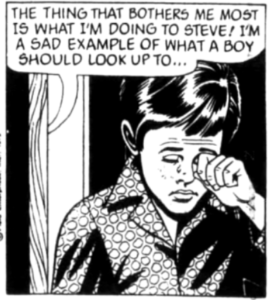
Finally, if you’re following the Dysfunctional Parenting story at Vintage Judge Parker (KFS), you’ll find the missing strips here.
On accounta we’re always prepared!
Well, pretty much always.
Comments 11
Comments are closed.